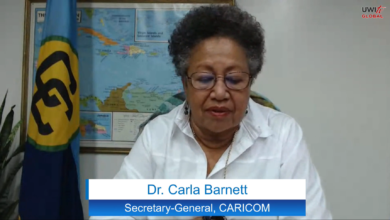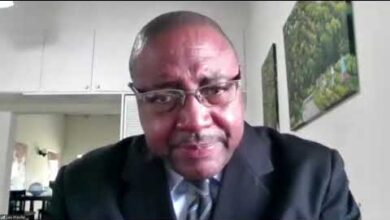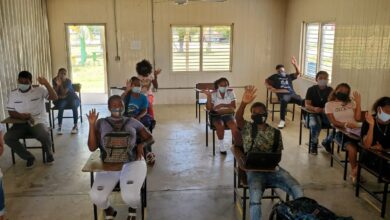|
Representatives of the CARICOM Secretariat
Association of Caribbean Media Workers Representatives of press and media associations Representatives of the Jamaican media Ladies and Gentlemen Let me take this opportunity to extend to you, on behalf of the Government of Jamaica, a warm welcome and to thank you for journeying here to participate in this workshop. It demonstrates not only your commitment to the regional integration agenda, but also the importance that you attach to engaging on Caribbean Single Market and Economy (CSME) issues. I would also like to extend a hearty welcome to representatives of the Jamaican media for your participation. I hope that the dialogue over the next two days will set the stage for even greater understanding of the CSME process, the challenges that it presents and where we go from here. This workshop is taking place at a time when the global economy is suffering one of the sharpest downturns since the Great Depression of the 1930s. There is little doubt that the end of the present downturn will be characterized by a reformed global economy, where the success of countries will not only be a function of their international political strategies but also on factors such as their levels of global competitiveness, innovation, human resource and infrastructural development, economic stability and the ability to attract and sustain investment. While these are critical prerequisites for our participation in the global economy, the size of our individual populations, economies and geographic space will perhaps dictate that, if properly implemented, taking into account various realities, CARICOM Member States collectively, rather than singly, can move towards meeting these goals in order to keep apace with the developments associated with globalization. The workshop is also taking place at a time when Governments are in the process of taking stock of the CSME regime following on a comprehensive Audit, by the CARICOM Secretariat, of the legal, regulatory and administrative framework of the regime. Particularly also, at a time when many see the CSME regime as being at a crossroads with serious consideration to be given to the future of the regime and how we should, realistically, function. At the recently convened CSME Convocation of CARICOM Heads of Government, which I attended in Barbados on 9-10 October, the Audit of the state of play of CSME implementation was presented to Heads and Ministers of Governments, the private sector, labour and civil society for discussion. This generated a lively exchange which brought into focus the fact that, in many cases, the legal framework is in place but there are still concerns about the CSME. The results of the Audit have, therefore, laid the ground-work for the Region to take stock of CSME implementation. The Audit has also presented us with the opportunity to assess the existing regional modus operandi and areas requiring improvements, as well as, to develop the next-steps to be taken in the process of implementation. I believe that over the next few months, CARICOM Member States such as Jamaica, will grapple with both the achievements and the challenges of the current regime which will, in turn, lead to country-based assessments of where we are and where we are headed in the context of the CSME regime. I should say, at this point, that Jamaica has, in good faith, met almost all of its obligations under the CARICOM Single Market and is working to fully implement the remaining provisions. While there have been challenges to the regime, some of the developments in the regime across the region are as follows:
We are also aware that there have been missed deadlines which we have to take into account. As the CARICOM Single Economy (CSE) proves more difficult to find convergence among Member States, it is critical that we consolidate and build on the progress made in implementing the CARICOM Single Market, before turning to any consideration of the Single Economy. Issues such as currency convertibility, a common currency and other elements will require assessment. It is, therefore essential at this time, to consolidate achievements under the CSM and to address the existing hurdles which still include the movement of people, goods and services. We should also take into account the fact that the CSME regime can also be seen as a nucleus which can fashion our relations with the world in terms of building external trade relations. The region must now examine and pursue, where feasible, policy dialogue and convergence in key areas of focus, to build a structure upon which the CSME can properly operate. I refer primarily to the further development and implementation of the following regional policies:
We should, however, not be afraid to go with works and discard what does not. In view of the Convocation that has just ended, this workshop comes at an opportune time as we engage the media in a dialogue on the achievements and challenges in CSME implementation as we seek a “critical mass of support”. The process of implementation is not only state-centered. It requires the participation of civil society, private sector and the media. We must never lose sight of the fact that the regional integration agenda is entirely owned by the people of the Caribbean, of which we are all a part. The CSME’s objectives cannot be achieved without an effective and well-organized public education machinery, to invoke ownership and to create “constituencies of support” for the regional agenda among the Caribbean people. It is within this context that the role of the media is of immense worth in promoting the regional agenda, particularly the CSME. We need your collaboration in highlighting the areas of success, to act as the collective conscience on those areas that we need vast improvement and to stimulate critical though on the part of Governments, the population, private sector and civil society. Because of the collective skills of the Caribbean Media, we are able to have access up-to-the-minute global developments:
All these are captured in the headlines and have been the focus of discussions for the regional public. This is the influence exerted by the media. This can also be employed, successfully, in promoting the CSME and in stimulating us to think of areas in which we need to work together and to address other areas in which we have been less than successful in order to provide a balanced approach. I would like to cite three key avenues through which, I believe, the media could partner with Governments, the private sector and civil society through:
I will now take them in turn. I. Public Ownership through Public Education I would like to reiterate that the extent of ownership of the regional integration process, among the people of the Caribbean, is a function of the effort invested in public education. The existing gap in the public’s knowledge of the CSME is a great cause for concern, specifically in an era when the regional agenda can be furthered to cushion our people from the negative effects of the changes associated with globalisation. CARICOM nationals cannot be expected to capitalize on the free movement of goods, services, people (to live, work and do business) and capital along with the right to acquire property and establish businesses, if they are not appropriately educated of the associated benefits. In a survey done by the Sir Arthur Lewis Institute of Social and Economic Research of the UWI in 2003, it was found that as much as 65% of Jamaicans had never heard of the CSME. Additionally, it was highlighted, in the same study that only 10% could identify any component of the CSME. If this is in fact the case, there is no surprise at the level of insularity that exists across the Region, a circumstance that serves as a reproach any advancement of a regional. We cannot often hold the public responsible for negative treatment of fellow CARICOM nationals, when, in many instances they are probably acting as a result of lack of knowledge. There is also a view that public education regarding the CSME is often conducted in a top-down manner, leaving those in the business of Government and administration more knowledgeable about it, while the wider population remain uninformed. Against this background, I make no reservation in expressing my view that public education is hopeless if the wider population is not sufficiently targeted. There is the need to strategically engage the schools and colleges, civil society, private sector, the various age cohorts and the public sector in any public education initiative. Governments, as you are all aware, often constrained in their efforts. We also expect the media to provide more frequent analysis to enrich the discourse on regional integration, presenting a balanced view, and to act as a watchdog for the regional and national processes and the operation of existing regional structures. With the media being the primary and most effective medium for this sort of engagement, it is inevitable for us to seek your assistance. We already have structures in place with organizations such as the Association of Caribbean Media Workers, the Public Information Unit within the CARICOM Secretariat, national press and media associations and government information agencies. There is urgent need for us to increase our collaboration. This is a challenge I issue to you. II. Dissemination of Information In addition to promoting ownership through public education, avenues for the dissemination of information must constitute a part of the regional communication network. Like any regime, it is inevitable that institutional changes will be made for the regional integration process to maintain its relevance as the CSME evolves. It also has to be borne in mind that new initiatives will be proposed, explored, deliberated, adopted and implemented. Additionally, challenges will arise that require the collective spirit and creativity of regional partners for resolution. These scenarios represent the dynamism of the environment in which we operate. But the levels of coherence, effectiveness, responsiveness and efficiency we desire for a region that needs to advance, will be compromised if the regional public is not kept abreast or given the opportunity to participate in the resolution of issues arising from developments. Again, I see the media as instrumental in communicating these developments to the people of the region. Too often important developments can be overlooked by a significant portion of the audience. III. Continuous Dialogue In order to achieve the goal of ‘ownership through public education’ on the one hand, and the ‘dissemination of information’ on the other, there is need for continuous dialogue between stakeholders of the regional integration process. In this regard, I again challenge the media to dialogue with Governments, the private sector and civil society. While we pursue the goal of advancing regional integration, continuous monitoring and evaluation cannot be a missing element. It is vital for there to be continuous dialogue with the regional media to periodically assess the performance of outreach initiatives, and adjust the strategies as appropriate. These are three primary areas that demand the input of the media for the successful implementation and operation of the CSME and in helping us to take stock and to re-evaluate the regime. In closing, let me again express appreciation for your participation in this workshop, as I am confident that the people of the region will be able develop a better understanding as you go back to your various countries, organizations and assignments. Let us, therefore, rise to the task of promoting ownership of the process, stimulating critical thought and faithfully reflecting and advancing a balanced approach to the CSME. I thank you. |
Press ReleasesStatements and Declarations






